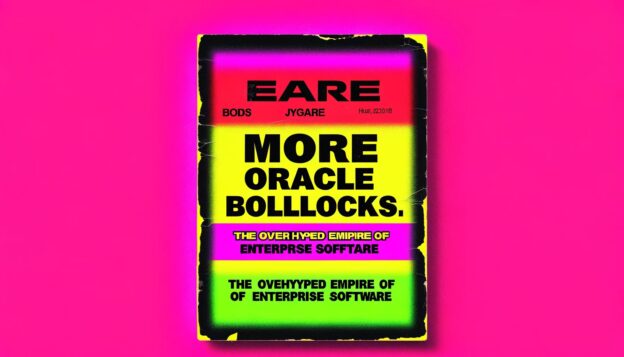Oracle, beloved by enterprise IT departments everywhere for its bulletproof reliability, affordable pricing, and impeccable customer service. Wait, who am I kidding? Oracle is the company everyone loves to hate: the heavyweight champion of convoluted licensing agreements, aggressive sales tactics, and overpromised software solutions. Sure, it’s the bedrock of many enterprises, but it’s also a towering monument to corporate tech bollocks.
Let’s dive into the myths and frustrations that make Oracle the undisputed king of enterprise software shenanigans of episode twenty-nine of my articles from my satirical comedic polemic series.
“Oracle Databases Are the Gold Standard”
Oracle’s flagship database software is often touted as the crème de la crème of enterprise data management. And yes, it’s powerful, if you’re running a Fortune 500 company with endless budgets and a dedicated team of Oracle-certified DBAs. But for smaller businesses or those looking for flexibility, Oracle’s offerings can feel like a bloated, over-engineered hammer for every nail.
Competitors like PostgreSQL, MySQL (ironically once Oracle’s acquisition), and even cloud-native databases often provide 80% of the functionality for a fraction of the complexity and cost. The idea that Oracle databases are the gold standard? It’s more legacy-driven bollocks than universal truth.
“Oracle Cloud Is a Major Player”
Oracle has poured billions into its cloud infrastructure, hoping to challenge the likes of AWS, Azure, and Google Cloud. Larry Ellison himself has proclaimed that Oracle Cloud will dominate, citing its “unparalleled” speed, performance, and cost-efficiency.
In reality, Oracle Cloud remains a distant competitor, struggling to shake its reputation as a niche player for companies already locked into Oracle’s ecosystem. Many customers choose Oracle Cloud out of necessity, not enthusiasm, because of the exorbitant costs of migrating away. The claim that Oracle Cloud is on par with the big three providers? Ambitious bollocks at best.
“Our Licensing Is Transparent”
Oracle’s licensing agreements are the stuff of IT nightmares. Complex, opaque, and often purposefully vague, they seem designed to trip up even the savviest enterprise buyers. With clauses that penalize customers for deploying software in virtualized environments or using features they didn’t even know were enabled, Oracle has turned licensing into a profit-maximizing art form.
The idea that Oracle’s licensing is “transparent” or “fair”? A masterclass in corporate bollocks.
“Oracle Is the Innovation Leader”
Oracle loves to market itself as a tech innovator, leading the charge with cutting-edge software and cloud services. But let’s be real: much of Oracle’s dominance comes from acquiring companies (like PeopleSoft, Sun Microsystems, and NetSuite) rather than developing its own groundbreaking technology.
For a company that spends billions on R&D, it’s hard to see Oracle as the trailblazer it claims to be. The narrative that Oracle is at the forefront of innovation? More acquisition-driven bollocks than genuine leadership.
“We Care About Our Customers”
If there’s one phrase that makes Oracle customers laugh nervously, it’s this one. Known for its aggressive audits and high-pressure sales tactics, Oracle often feels more like a landlord than a partner. Need help resolving a technical issue? That’ll be extra. Thinking of leaving the Oracle ecosystem? Prepare for a battle over compliance fees and data lock-in.
The claim that Oracle puts its customers first is the kind of bollocks that makes even seasoned IT managers roll their eyes.
“Autonomous Database Will Change Everything”
Oracle’s autonomous database promises to revolutionize data management with AI-driven optimization, self-repairing capabilities, and hands-free administration. While the concept is impressive, in practice, many customers find it difficult to implement without significant hand-holding, and a hefty bill.
The idea that the autonomous database will eliminate the need for human expertise is oversold bollocks. It’s not hands-free; it’s hands-off-your-wallet.
“We Offer the Best Value for Money”
Oracle’s pricing strategy is famously high, justified by claims of unparalleled performance, reliability, and enterprise-grade features. But the hidden costs, like expensive add-ons, complicated support tiers, and punitive licensing terms, often leave customers wondering if the juice is worth the squeeze.
Competitors like AWS, Azure, and open-source solutions often offer similar capabilities for less. The notion that Oracle is the best bang for your buck? Laughable bollocks for anyone on a budget.
“Our Tools Are Easy to Use”
From Oracle E-Business Suite to Oracle Fusion, the company’s software is marketed as intuitive and user-friendly. Yet anyone who’s wrestled with these tools knows the truth: Oracle’s interfaces are about as inviting as a 1990s government database.
Onboarding and training for Oracle products can take months, and even experienced users often need a roadmap to navigate their labyrinthine menus and features. The promise of “ease of use”? Absolute bollocks that only Oracle’s marketing team could believe.
“We’re Committed to Open Source”
Oracle loves to champion its contributions to open source, particularly through its stewardship of MySQL and Java. But its track record tells a different story. After acquiring Sun Microsystems, Oracle faced criticism for its handling of Java (including lawsuits over its API licensing) and its slow development of MySQL.
The idea that Oracle is a benevolent supporter of open source is more PR-driven bollocks than reality.
Conclusion: Oracle’s Empire of Bollocks
Oracle’s dominance in enterprise software is undeniable, but its reputation is built as much on aggressive sales tactics and customer lock-in as on technical excellence. While its products are powerful, they’re also expensive, complex, and often frustrating to use.
If you’re locked into the Oracle ecosystem, you probably know the pain. If you’re considering it, tread carefully. Because while Oracle delivers robust enterprise solutions, much of what it promises, whether about its innovation, value, or ease of use, is, quite simply, bollocks.
